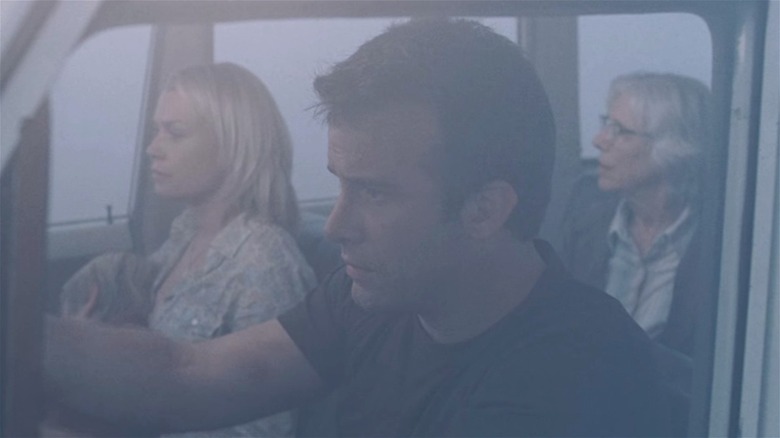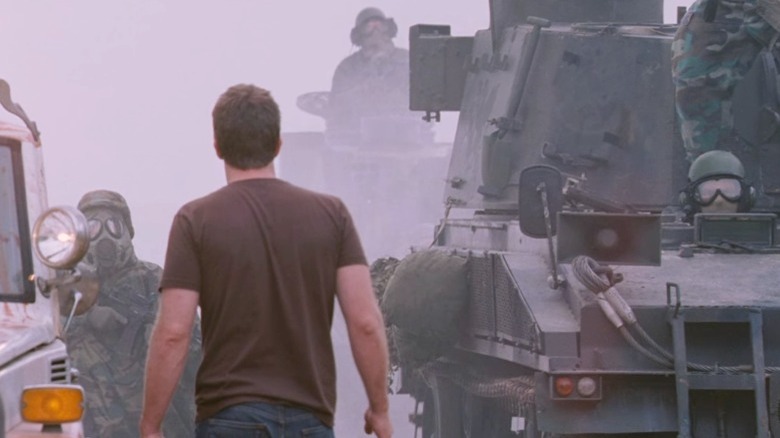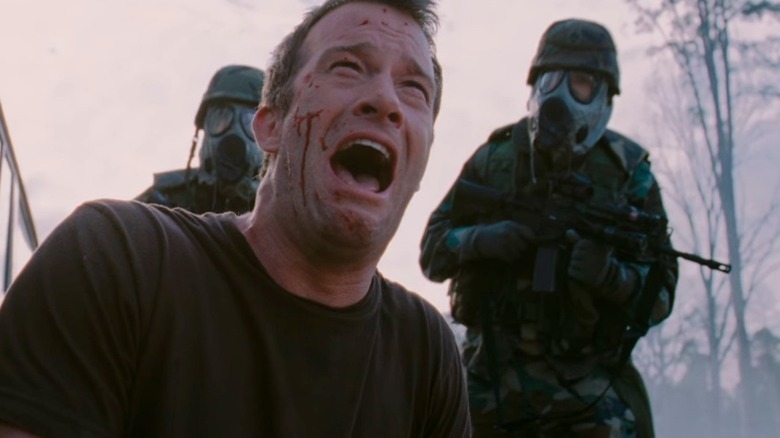The Mist's Most Brutal Detail Wasn't Even In The Script [Exclusive]
Some horror movies end with the cathartic survival of the protagonist(s), while others end with a brutal twist of the knife, which haunts you even after the credits roll. The latter is true in the case of the bone-chilling ending of Frank Darabont's "The Mist," an adaptation of Stephen King's novella. Darabont's decision to end "The Mist" on such a hopeless, anguished note for David Drayton (Thomas Jane) is certainly a bold decision, as the difference between lifelong trauma and hopeful survival for the characters hinged on a mere 60-second delay. Had David and the others waited a tiny bit longer, four lives would not be lost in vain, as the army vanguard arrive moments later to rescue the remaining survivors.
The tragedy of David's situation is heightened by the fact that he survives the ordeal and now has to live with the guilt of the deaths, along with that of his child, Billy (Nathan Gamble). While Darabont always intended to depart from the novella's ending and deliver something heart-wrenching, the most brutal detail in that scene was not even in the original script. As David watches the survivors being taken to safety in the army trucks, he sees the woman who wanted to go save her kids at home (played by Melissa McBride), along with her two children. This little detail intensifies the tragic ending of "The Mist" and elevates the pathos of David's situation.
/Film's Eric Vespe recently spoke to Darabont, McBride, and actor Jeffrey DeMunn for his 15th-anniversary oral history of "The Mist," and asked them how this added detail was conceived. DeMunn, who played Dan Miller, revealed that it was his impromptu idea to request Darabont to include this detail, and the director was more than thrilled to accommodate.
A cruel twist of fate
When McBride's character asks folks in the supermarket to escort her home so that she can meet her kids, nobody is willing to do so (which is understandable). Dejected, she decides to walk home alone in the mist, which happens to be swarming with eldritch creatures. As the audience is unaware of what happens to her, and the focus is on the protagonists inside the supermarket, there's a subconscious assumption that she might not have survived. While this was the original intention, DeMunn was struck with the idea of revealing her fate toward the end. DeMunn told /Film:
"An idea just blasted into my head that Melissa should reappear in that final scene in the truck with her kids after having said, 'Is there no gentleman here who's going to walk me to my car' or whatever it was she asked and then just walked out. And I remember running into Frank out in the hallway and I said, 'Oh Frank, I think that Melissa should be in one of those trucks that goes by.' And he just leapt in the air. It was wonderful. He said, 'Yes.'
Darabont confirmed this by saying that DeMunn's idea was "a brilliant grace note" which highlights that survival is a gamble, as "sometimes, s*** is random." Although David and co. had a solid chance at survival, it is rotten luck that births tragedy. Meanwhile, McBride's character could have just walked home without encountering any creatures, as she had left the supermarket early on in the film when the monsters were slowly escaping from the facility. Darabont went on to show his appreciation for the need to "constantly bounce things off" the people he works with, and said that credit should be given where it is due.
Survival can often be arbitrary
McBride told /Film that her character was not aware of the unfortunate assisted suicides inside the car, and from her perspective, she only sees David yelling in anguish. As she only remembers him as one of the many townsfolk who refused to help her, the tragedy of his situation is lost on her. McBride joked about what probably must have crossed her character's mind when she sees David:
"I was trying to remember what exactly I was thinking. We drove by, we did several takes of driving by, and I know that in my perspective, I'm not seeing bodies in the car. I don't know what he just did. I just know that 'Wait, is that guy at the store? That's the guy that wouldn't leave with me? Okay, well he's going to be okay.' He's a little stunned. A little worse for wear, but he's going to be okay. Jerk. [laughs]."
While audiences feel a tinge of relief when they see McBride's character safe with her kids, the feeling is short-lived, as David's situation massively overshadows this moment. This contributes to the bleak nature of an already heartbreaking ending, as we know that David is never going to recover from such a psychologically traumatic event. His wife does not make it, and he assisted the suicide of four people who could've made it out alive, including his son. The fact that he has to live with the burden of his actions is probably way scarier than being hounded by massive monsters in the mist.


